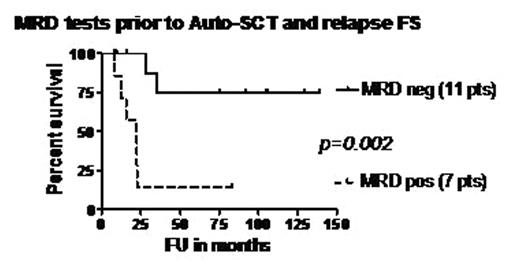Abstract
Introduction and aims. Molecular monitoring of minimal residual disease has provided an independent and prognostically significant parameter in evaluating outcome in adult and childhood acute lymphoblastic leukaemia (ALL). The aim of our study was to assess the impact of MRD measured in bone marrow samples collected at time of harvest or prior to harvest in adult B cell receiving autologous stem cell transplant and correlate MRD with overall clinical outcome.
Patients and Methodology. Patients were selected as de novo adult ALL of B cells. All patients were negative for the t(9;22) or (4;11) and had received chemotherapy followed by an autologous SCT (A-SCT). All patients had at least one molecular marker which was tested by quantitative or semi-quantitative PCR with sensitivity ≥1E4. End points were either clinical relapse or CCR with follow up ≥12 months except for two patients who died in CR following transplant, due to infections. Time point for molecular evaluation was a test preceding A-SCT or harvested BM. Nineteen patients were evaluable prior to/or at time of harvest. Nine were females and nine were males. Median age was 25.2 yrs (range: 15.2–52 yrs), total WCC was 7.1 (range: 2.3–68.9×109/l) at time of diagnosis with common ALL (14 pts) as the predominant phenotype. Patients received an A-SCT at a median period of 6 months from diagnosis (range: 5–18 months). Eight patients relapsed (median period to relapse: 22 mo; range: 8–35 mo) and 8 were in continuous clinical remission (CCR) (median follow up 33 mo; range: 8–139 mo). Median interval between Auto-SCT and relapse was 13.7 mo (range: 3–29 mo).
Results. In seven patients residual disease was demonstrated in the BM prior to A-SCT and 6 of them relapsed. In 12 patients no residual disease was detected at time of harvest or prior to transplant and 10 are at present in CCR. The association between MRD positivity and relapse and MRD negativity and CCR was statistically significant in this cohort of patients (p=0.002)(Figure 1).
Conclusions. Molecular monitoring of MRD can provide a useful tool for the monitoring of residual disease in BM harvest prior to SCT and correlates with outcome. It is therefore important that all BM harvests are tested for residual disease in future clinical trial that may use MRD for patients’ stratification.
MRD tests prior to Auto-SCT and relapse FS
Author notes
Corresponding author


This feature is available to Subscribers Only
Sign In or Create an Account Close Modal